Advertisement
50 Years Of Coach Wooden And Kareem, Through Racism, Olympic Boycott And More
Resume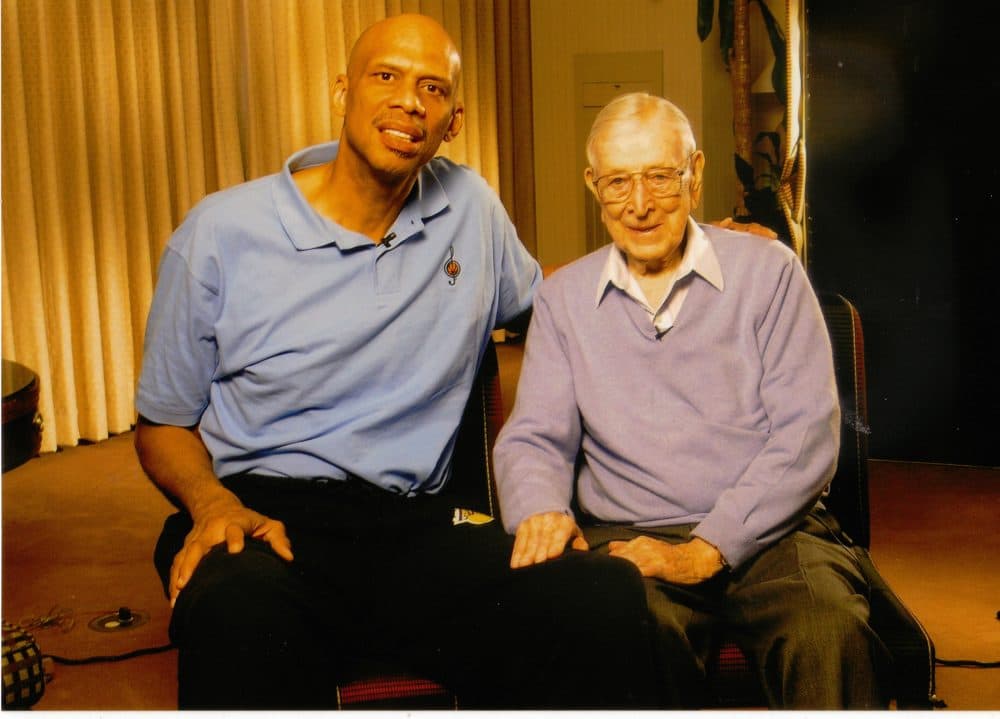
This story originally aired May 19, 2017. This week it appears again as part of our Role Models Show.
"I’m Kareem Abdul-Jabbar. And you can call me Kareem, please."
"I was hoping you'd say, 'You can identify me as a writer and activist who once played some basketball,' " I respond.
"That’s too long," Kareem says with a laugh.
Too long, maybe. But not wrong. Kareem Abdul-Jabbar, the NBA's all-time leading scorer, has written over a dozen books: history, social commentary, kids’ books, autobiography — and he’s only 71.
Anyway, I had the opportunity to talk with Kareem recently. One of the things on his mind was his relationship with celebrated college basketball coach John Wooden, who recruited Kareem to UCLA in 1965, when Kareem was still Lew Alcindor.
"For me, it was an insight into what Mr. Wooden was all about when I first met him," Kareem explains, "because we started talking, and we immediately got off the subject of basketball. And he said, 'You know, I noticed that you have good grades, and UCLA is an excellent school. I expect you to do well here.' And, you know, I was kind of surprised. Most basketball coaches don’t care about that, and I understood immediately that we were simpatico that way. I was at UCLA to get an education, and we struck it off right away in terms of vision and appreciation of each other’s goals."
'I Dealt With It. But Coach Wooden Was Flabbergasted'
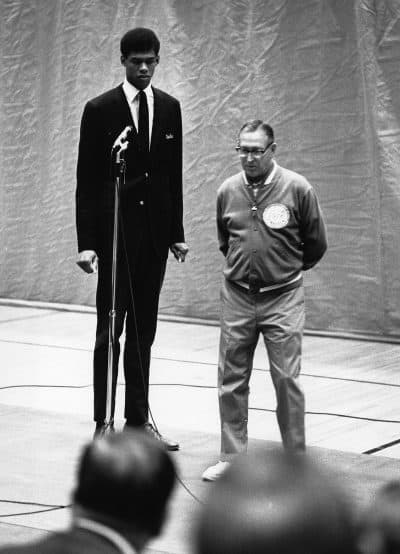
Still, on the surface, the young, gangly, 7-foot-2 center and his middle-aged coach couldn’t have been less alike. Kareem, black and New York; Wooden, white and Indiana. And it didn’t take long for Kareem to begin to understand how their different backgrounds would determine how they handled circumstances they encountered together. Take, for example, a meal they shared at a sports bar during Kareem’s recruiting visit.
"Well, we went to The Bat Rack and had dinner," Kareem says. "Coach Wooden was getting to know me, and a woman, a very elderly white woman, approached Coach Wooden. I was standing right near them. And she asked him some questions about me, and wanted to know how tall I was. And then she used the N-word in saying that she’d never seen anybody that tall."
It wasn’t how the dinner was supposed to have gone. But even at 18, Kareem was not naive.
"You know, I had been through that before," he says. "It was nothing new to me. So, you know, I dealt with it. But Coach Wooden was flabbergasted. He was stunned. He didn’t know how to reply. She walked off and didn’t — to her, it was just her feeling out her curiosity about my height."
"It seems to me that he might’ve been stuck," I say. "I mean, obviously he doesn’t want to just let it slide, but also he doesn’t want to insult an elderly woman, I guess."
"Right. He didn’t expect to hear that from someone like that. It reminds me of a — did you see the movie "Blazing Saddles?' "
"I did, indeed," I answer.
"Yeah, when Cleavon Little is talking to the lady — had the pies. And she uses the N-word like that. It’s kind of the same thing, you know?"
Thus began this development of a lasting friendship between a coach who didn’t know what to do when an old lady referred to his player and dinner guest with a racial slur, and a player who could appreciate and empathize with his coach’s discomfort.
'It's Tough Being No. 1'
John Wooden was in his mid-50s when he recruited the 18-year-old Kareem. I was beginning to understand how the older man, who was supposed to be the teacher, learned from the younger one. Which was part of what Kareem had on his mind when we spoke. Because in 1966, when Kareem, still known as Lew Alcindor, began carrying the UCLA basketball program to heights previously unimagined, John Wooden found himself in a position he’d never experienced.
"I think I took some of the fun out of it for him," Kareem says. "Because prior to me coming to UCLA — UCLA, the first year they won the NCAA tournament, they were underdogs. And then the second year, everybody was excited to see them repeat. And then, here I come along, and the three NCAA tournaments that I played in were the first three of seven in a row, and people got sick of UCLA at that point. And instead of playing to win, Coach had to coach in a way not to lose.
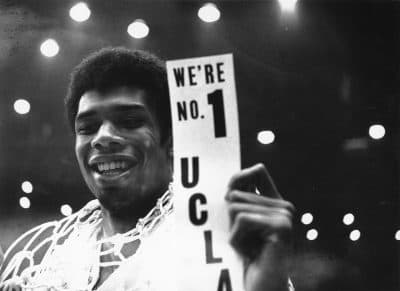
"And it’s tough being No. 1. It’s tough to stay up there and maintain that excellence and try to extend your ability to dominate."
So there was pressure, even with the best player in the country piling up points while UCLA overwhelmed opponents by scores like 116-78 and 122-57. But Kareem also recalls that during those days, for the players and their coach, there was time for learning — yeah, that word, again — sometimes during games, and on one especially memorable occasion in early December 1968, after they’d put another win in the books.
"Well, we were on a bus trip, going between games that we had to play in the Midwest," Kareem says. "We were driving from Columbus to Notre Dame. And we just kind of backed into a conversation, me and some of the guys, about our various religious beliefs. And we had a pretty varied group of guys. We had two Jewish guys on the team, and a couple guys in the Fellowship of Christian Athletes. And then I had converted to Islam, but I hadn’t told anybody about it. And I started to talk about my religious beliefs, and we kind of got to the point where we started to listen to each other. You know, we didn’t try to dominate the conversation with proselytizing and demanding that everybody see it the way one or the other of us wanted to see it. And it was a nice experience.
"Coach Wooden kind of came and stood on the periphery and listened and kind of edged us on in order to give everybody the opportunity to speak. And it really brought us close together."
"Did that ever happen again?" I ask.
"No, I don’t think it did, 'cause, you know, the time, and the quiet and just no interference," Kareem says. "Good ride, you know?"
So there was all that winning — UCLA won 88 regular season games and lost just two while Kareem was there — and there was learning. But it wasn’t all sweetness and light. Some of Kareem’s teammates took issue with John Wooden’s rules, which they felt were arbitrary. It was the '60s, after all.
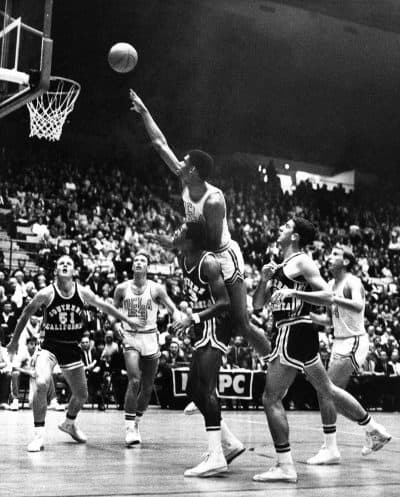
One Wooden mandate: short hair, allegedly because the coach thought otherwise his players might leave the gym after showering with wet hair and get colds.
But Kareem was able to see beyond Wooden’s rules and motivational sayings to the coach’s deeper purpose.
"He didn’t see himself as someone who dehumanized the people that he had to work with in terms of coaching them," Kareem says. "How did Coach describe it? He said, 'A coach is someone who can criticize without creating resentment.' "
"And you’re laughing," I say. "It sounds like maybe it didn’t always work."
"No, it did! He knew how to do it."
Lessons, 'From Day 1 Until The Day He Passed'
And sometimes Coach Wooden surprised Kareem with how well he knew how to do it. In 1968 Kareem was urged to join the U.S. team that would be competing at the Olympics in Mexico City. As a patriot, Coach Wooden expected no less. Kareem was not receptive.
"For me, that was an especially sore issue," he says. "Dr. King had just been assassinated. I wasn’t feeling very patriotic. But what really affected me was the fact that I was going to have to work with Avery Brundage. Avery Brundage is the individual who told the Jewish players on the 1936 Olympic team that they couldn’t compete because it would annoy Mr. Hitler. And, you know, he was still the chairman of the [International] Olympic Committee, and I wasn’t gonna do anything with him. So, for me, it was an easy decision."
An easy decision that Kareem thought might cause a rupture in his relationship with Coach Wooden. But Wooden never mentioned it. And then, many years later, Kareem learned that John Wooden had recalled and processed the lessons he’d begun learning at that dinner at The Bat Rack.
"Yes. John Wooden received a letter from a woman that was upset that I was considering a boycott of the Olympic Games," Kareem says. "And then Coach Wooden wrote back to her and said that he had seen firsthand what black Americans have to deal with at times, and he understood why a protest would be something that any black American with common sense might want to consider. He got that. I have that letter, and, you know, I printed it, and it’s published."
"How did you come into possession of that letter that Wooden had written in response to the woman who wrote him?" I ask.
"Coach Wooden gave it to me. He had saved it, and he said that he thought I should have it. It’s one of my prized possessions, you know, because it’s written in his hand."
As a very large black man and an astonishingly successful player in hostile arenas, Kareem was often the target of abuse. From time to time, John Wooden witnessed it. He tried to reinforce the idea that Kareem should try to refrain from judging everybody on the basis of the actions of those who insulted him.
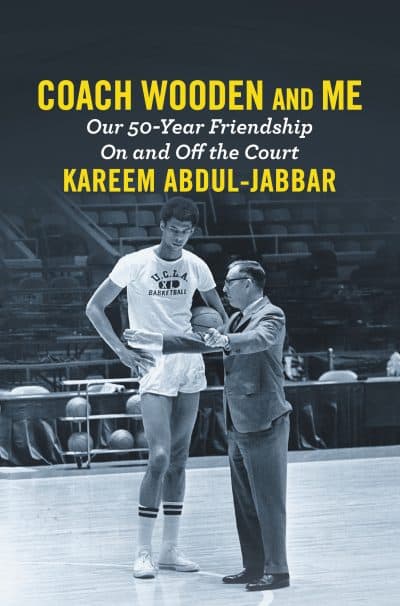
But Kareem didn’t realize how deeply some of those incidents had affected his coach. As Kareem has recalled, "It wasn’t until years later that I found out that because of me, he’d begun to question his own belief in the innate goodness of people."
When Kareem Abdul-Jabbar’s mother died in 1997, he and John Wooden talked at length, as they had when John Wooden’s wife passed away in 1985. And when John Wooden emerged from the depression into which the death of his wife of half a century had plunged him, it was Kareem he called to say, "I’ve found my sense of purpose again."
It must have felt like particularly good news. Certainly John Wooden, who died in 2010 at the age of 99, had a lot to do with Kareem Abdul-Jabbar’s ongoing discovery of his own sense of purpose as a teammate and a man.
"And I'm so thankful," Kareem says. "You know, I learned from this man from Day 1 until the day he passed, and since he has passed I'm still learning from my experiences with him. He was an incredible human being."
Read Kareem Abdul-Jabbar's book, "Coach Wooden and Me: Our 50-Year Friendship On and Off the Court," to learn more.
This segment aired on May 26, 2018.
